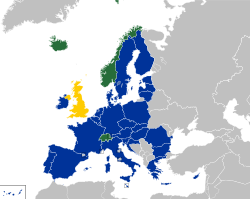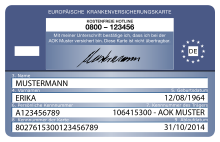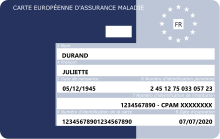
Back Euruopas svēkatas draudėma kuortelė BAT-SMG Targeta sanitària europea Catalan Evropský průkaz zdravotního pojištění Czech Auslandskrankenschein German Ευρωπαϊκή Κάρτα Ασφάλισης Ασθενείας Greek Tarjeta sanitaria europea Spanish Eurooppalainen sairaanhoitokortti Finnish Carte européenne d'assurance maladie French Európai Egészségbiztosítási Kártya Hungarian Tessera europea di assicurazione malattia Italian
| European Health Insurance Card | |
|---|---|
 Example of a Slovenian EHIC card | |
 Validity of EHIC cards | |
| Issued by | Member states of the European Economic Area[a][1] Switzerland United Kingdom[b][2] |
| First issued | 1 June 2004 |
| Purpose | Access to free or reduced cost health services in any EEA member state, Switzerland and the United Kingdom |
| Valid in | European Economic Area Switzerland United Kingdom[c] |
| Eligibility | EEA, Swiss or UK residency[d] |
| Cost | Free |
| European Union decision | |
| Text with EEA relevance | |
 | |
| Title | Decision No 189 of 18 June 2003 aimed at introducing a European health insurance card to replace the forms necessary for the application of Council Regulations (EEC) No 1408/71 and (EEC) No 574/72 as regards access to health care during a temporary stay in a Member State other than the competent state or the state of residence [3] |
|---|---|
| Made by | The Administrative Commission |
| Journal reference | [1] |
| Current legislation | |


The European Health Insurance Card (EHIC) is issued free of charge and allows anyone who is insured by or covered by a statutory social security scheme of the EEA countries, Switzerland, and the United Kingdom to receive medical treatment in another member state in the same way as residents of that state—i.e., free or at a reduced cost—if treatment becomes necessary during their visit (for example, due to illness or an accident), or if they have a chronic pre-existing condition which requires care such as kidney dialysis. The term of validity of the card varies according to the issuing country. Continued reciprocal healthcare access between the EU and the UK was agreed, and the UK issues a UK Global Health Insurance Card (GHIC) valid in the EU, but not other EEA countries.[4]
The intention of the scheme is to allow people to continue their stay in a country without having to return home for medical care, and does not cover people who have visited a country for the purpose of obtaining medical care, or non-urgent care that can be delayed until the individual returns to their home country (for example, most dental care). The costs not covered by self-liability fees are paid by the issuing country, which is usually the country of residence, but may also be the country from which the patient receives the most pension.[5]
The card only covers healthcare which is normally covered by a statutory health care system in the visited country; additional costs can be met by taking out travel insurance.
Cite error: There are <ref group=lower-alpha> tags or {{efn}} templates on this page, but the references will not show without a {{reflist|group=lower-alpha}} template or {{notelist}} template (see the help page).
- ^ "Brexit : De la paperasse et des coûts supplémentaires en vue pour les Britanniques". Le Monde.fr. 13 July 2020.
- ^ "Get healthcare cover for travelling abroad". nhsbsa.nhs.uk. NHS Business Services Authority. 15 August 2018. Retrieved 6 January 2021.
- ^ "EUR-Lex - 32003D0751 - EN - EUR-Lex". eur-lex.europa.eu. Retrieved 26 August 2020.
- ^ "Healthcare for UK nationals visiting the EU". GOV.UK. Retrieved 2021-01-01.
- ^ "Are foreigners really gaming the NHS to pay for their medical treatment abroad?". Guardian. 11 August 2015. Archived from the original on 23 September 2021. Retrieved 22 August 2015.
© MMXXIII Rich X Search. We shall prevail. All rights reserved. Rich X Search